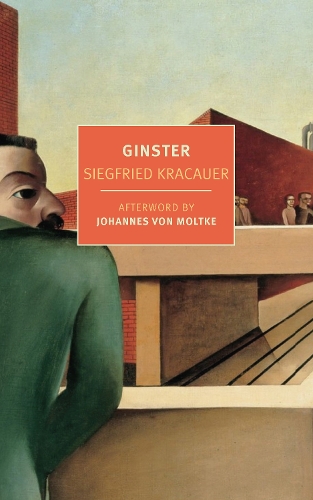
Ginster
(Paperback)
Publishing Details
Ginster
By (Author) Siegfried Kracauer
By (author) Carl Skoggard
New York Review Books
NYRB Classics
23rd September 2025
7th October 2025
United States
Classifications
General
Fiction
833.912
Physical Properties
Paperback
336
Width 127mm, Height 203mm
Description
When World War I breaks out, a young architecture student in Munich does everything in his power to avoid being enlisted into the German military in this perceptive, wickedly humorous novel by a prominent twentieth-century writer, journalist, and film critic. When World War I breaks out, a young architecture student in Munich does everything in his power to avoid being enlisted into the German military in this perceptive, wickedly humorous novel by a prominent twentieth-century writer, journalist, and film critic. Siegfried Kracauer's Ginster is the great World War I novel you've never heard of. Here, the sheer horrors are kept offstage, as in Greek tragedy, and merely reported from time to time. The setting is the German home front. Its Chaplinesque antihero-Ginster-spends the war gumming up the German war machine as he maneuvers to stay out of its clutches and save his own skin. Which he does; however, there is a deeper struggle going on between Ginster's dreamy self-absorption and the pitiless organization of society, war or no war. Ginster has no wish to do anything. Alas, his reveries are forever being interrupted by the demands of an other-minded world. All the scenes of Ginster are well to the rear of the military action, yet with Kracauer narrating, military language saturates all aspects of civilian life in the homeland. Ginster's nearest and dearest are so gung-ho, he feels that he's at the front when he visits them. War, the author seems to say, is merely ordinary life seen from the back instead of the front. As a new European war darkens our horizon, one no more expected than was World War I, Kracauer's novel feels timelier than ever.
Reviews
Kracauers mordant satire has the caustic power of Celine but is less coarse and choleric. Sharp criticisms of patriotism, cronyism, and the war itself are tempered by the fanciful observations of a character who has the eye of a visual artist... The result is a tour de force of language enriched by gallows humor. Publishers Weekly Starred Review
"Ginsters name belongs with modern literatures antiwar activists from the Good Soldier vejk to Yossarian." Kirkus Reviews
The reissue of this novel now is valuable, beyond its considerable historical and aesthetic virtues, because it makes pertinent points about todays world, bedeviled by war, misery, poverty, and the enticing lure of despotism as an answer to democracys shortcomings.Thomas Filbin, The Arts Fuse
Author Bio
Siegfried Kracauer (1889-1966) was a German novelist, film theorist, and cultural critic. He worked as the film and literature editor of the Frankfurter Zeitung between 1922 and 1933, and he has been associated with the Frankfurt School of critical theory through his friendships with Theodor Adorno and Leo L wenthal. From 1941 until his death in 1966, Kracauer lived and worked in the United States, where he wrote two of his most influential works, From Calgari to Hitler and Theory of Film. Carl Skoggard is a writer and translator based in Hudson, NY. His translations include Walter Benjamin's Sonnets and a later novel by Siegfried Kracauer, Georg. Johannes von Moltke is a professor of German and of film, media, and television at the University of Michigan. His book The Curious Humanist- Siegfried Kracauer in America was published in 2015.
